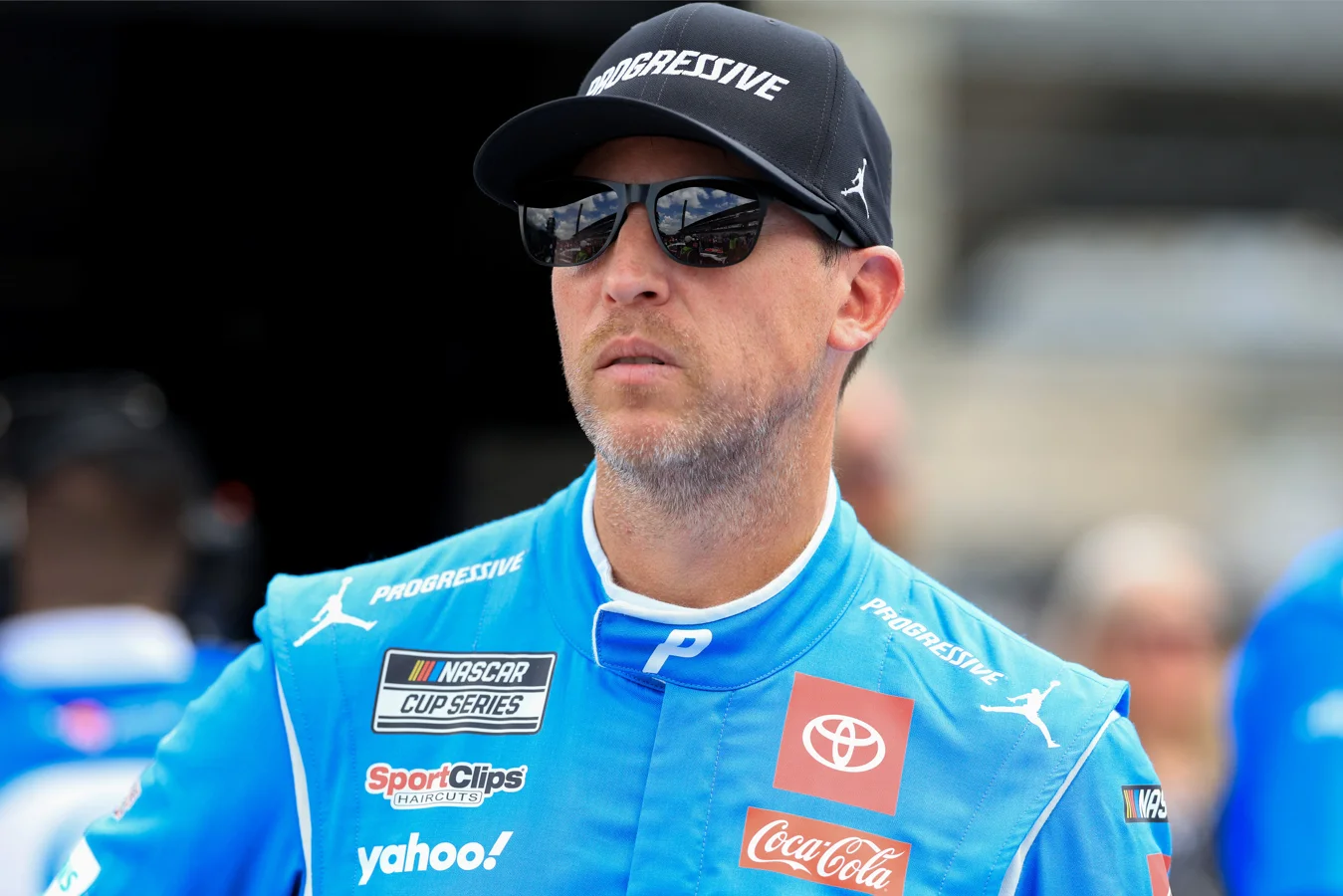Denny Hamlin criticizes NASCAR Next Gen cars, raising concerns during a recent podcast episode, while his fiancée, Jordan Fish, publicly supports phone-free schools as their children return to the classroom. The couple, known for their long-standing relationship and family life, are each using their platforms to discuss important changes in sports and education.
Jordan Fish Shares Family Milestones and Advocates for School Safety Initiatives
As the school year resumed, Jordan Fish shared moments from her daughters Taylor and Molly’s transition back to academics on Instagram. Taylor has started seventh grade, while Molly participated in her school’s Meet the Teacher event. Fish also shared a photo of their newborn, Jameson Drew Hamlin, hinting that he joined the family to see off his older sisters as they began the school year.
Shortly after these updates, Jordan Fish reposted a video from social psychologist Jonathan Haidt, featuring Alabama social studies teacher Jonathan Buchwalder discussing the merits of phone-free schools. Supporting Buchwalder’s perspective and the #FOCUSAct — a movement intended to reduce unnecessary screens for student safety — Fish wrote:
“I’m so here for this!” —Jordan Fish, Public Figure
Through her endorsement of the initiative, Fish highlighted her commitment to student well-being and distraction-free learning, aligning with broader debates on technology use in classrooms.
A Look Back at Denny Hamlin and Jordan Fish’s Relationship and Family
Denny Hamlin and Jordan Fish’s connection dates to 2007. Their first meeting occurred at a Charlotte Bobcats game where Hamlin was courtside and Fish was performing as one of the Lady Cats. Since then, their relationship has grown, culminating in an engagement in 2024 and the expansion of their family to include three children. Their family moments are frequently shared with fans, underscoring their status in the sports and entertainment world.
Hamlin Voices Concerns over NASCAR’s Direction with Next Gen Cars
Denny Hamlin used his Actions Detrimental podcast platform to share pointed opinions regarding NASCAR’s current vehicle lineup. Reflecting on Shane van Gisbergen’s recent victory at Watkins Glen, Hamlin described the Next Gen cars as suffering from a “fundamental problem.” He remarked that fans have developed a strong dislike for these cars, mirroring the sentiments of drivers. In reference to the much-discussed Car of Tomorrow (COOT), Hamlin commented:
“was certainly a step back in that performance of raceability.”
—Denny Hamlin, NASCAR Driver
He proceeded to compare modern vehicles with older NASCAR models, particularly the Gen 4 car used between 1992 and 2007, drawing analogies to strategies seen in the Xfinity Series. Hamlin observed that in past eras, racing required leaders to work closely together, resulting in tight competition:
“I was watching the Xfinity race, and it was like gosh dang, you saw these leaders all in a clump, and nobody could get away because all it took was the second-place guy to get close to the leader, and it would get them all out of shape, and then they couldn’t go anywhere.”
—Denny Hamlin, NASCAR Driver
Expressing frustration with the current trajectory of NASCAR technologies, Hamlin suggested that decisions about car configurations and horsepower are taken by higher authorities, often without input from those who race. He further commented:
“These are decisions that get made from beyond our offices — these are 10th-floor decisions, and let’s just say us drivers are on the third floor. I hate to say it, but no business is immune to bad decisions, and I think the NASCAR business has made some horrible decisions over a given amount of time.”
—Denny Hamlin, NASCAR Driver
Technical Background and the Current Debate Around Next Gen Cars
The Next Gen NASCAR vehicles are known for producing 670 horsepower on most tracks, with reduced output at Talladega and Daytona to 510 horsepower. These specifications have led many drivers, including Hamlin, and insiders within the industry to criticize the car’s impact on racing excitement and overtaking opportunities. The concerns reflect a broader dialogue about how evolving car designs can affect the competitive nature and appeal of NASCAR events, with voices like Hamlin’s adding urgency to discussions about future changes.
What These Conversations Mean for NASCAR and Student Well-being
Denny Hamlin’s critique of the Next Gen cars brings attention to ongoing dissatisfaction among drivers and fans, which could prompt further review of racecar design and NASCAR’s regulatory decisions. Meanwhile, Jordan Fish’s advocacy for phone-free educational environments adds to a growing discourse on the importance of minimizing digital distractions in classrooms, potentially influencing similar policies in other schools. Together, Hamlin and Fish’s initiatives reveal the significant impact that public figures can have in shaping debates both on the racetrack and in education policy.
